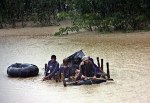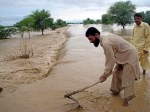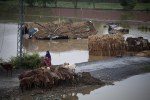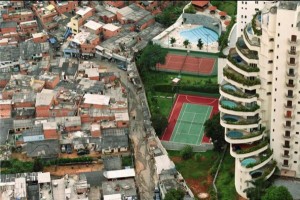The great double game
Pakistan is in the midst of storm and completely engulfed by a disasters both man-made and also natural. Thomas Friedman a New York Times columnist writes so perceptively about our problems and how we can sort them out. Only if the Pakistani policymakers were to listen.
”Pakistan, 63 years after its founding, still exists not to be India. The Pakistani Army is obsessed with what it says is the threat from India — and keeping that threat alive is what keeps the Pakistani Army in control of the country and its key resources. The absence of either stable democracy in Pakistan or a decent public education system only swells the ranks of the Taliban and other Islamic resistance forces there. Pakistan thinks it must control Afghanistan for “strategic depth” because, if India dominated Afghanistan, Pakistan would be wedged between the two.
Alas, if Pakistan built its identity around its own talented people and saw its strategic depth as the quality of its schools, farms and industry, instead of Afghanistan, it might be able to produce a stable democracy — and we wouldn’t care about Pakistan’s nukes any more than India’s.”
Photo Essay: Floods in Pakhtunkhuwa
Floods caused by the recent three-days monsoon rains have created havoc in the northern parts of Pakistan, displacing hundreds of thousands, and according to latest reports death toll has rise to more than 5oo people. Nowshera city is completely submerged in water and many other towns in the region are facing the same problem. The following photo essay demonstrates the intensity of human suffering which could have been completely avoided, if the government agencies had responded qucikly.
Torrential rains kill five in Gilgit-Baltistan
The recent torrential rains that have engulfed the northern regions of Pakistan have claimed five lives in Gilgit-Baltistan and reportedly 152 died in various districts of Pakhtunkhuwa province. According to media reports three children in Tangir valley, one lady in Hodor and one young man in Khalti village near Phander were swept away in the water. Many more have been rendered homeless, and seasonal crops were destroyed, hundreds of apple, apricot, and other fruit trees were also uprooted along river banks in Gilgit, Yasin and elsewhere across the region.
A local resident in Kondodas, Gilgit told GB Post that he was ‘horrified’ to see the flooding in Hanesara and ‘this is the first time that the river has been so much flooded’. GB adminsitration has asked the army to help in relief operations and ensure that further lives are not lost.
Governance in Gilgit-Baltistan
GB Post always welcomes critical views and commentary that concerns Gilgit-Baltistan. In what follows Aziz Ali Dad, a promising young intellectual of the region reassess governance challenges and offers a fresh perspective on what can be done to bring about positive change in the region.
Aziz Ali Dad
The region of Gilgit-Baltistan has remained always an anomaly in the political system of Pakistan. There are several factors that contributed to its status being kept in constitutional limbo. Foremost among these is the Kashmir dispute, as well as regional geopolitics at large. Although the region is not a direct party to the conflict, it remains relevant to the issue because of its strategic location. Various governments in Pakistan have tried to incorporate Gilgit-Baltistan into the country’s political structure.
The announcement of the Gilgit-Baltistan Empowerment and Self-governance Order by the government last year was the latest attempt by the state to bring the region into Pakistan’s political mainstream. Under the current dispensation a newly elected assembly has elected a chief minister and a governor has been appointed by the federal government. It is for the first time that the region enjoys its own setup with an empowered legislature. People have high expectations regarding the delivery of results from the elected members Gilgit-Baltistan Legislative Assembly (GBLA).
Effective management of the affairs of the assembly and good governance will require that the leaders rise above petty personal interests. The members of the GBLA and the new setup should master the modern mode of governance. Application of worn out strategies for the management of the new system would be doomed to failure.
To ensure good governance it is indispensable for GBLA members and the staff associated with the assembly to be truly empowered. The existing setup and procedures are new to most of the members of the assembly. In the absence of clear understanding of the system the local administration there is a state of confusion resulting from the fact that while the administration has experience of the previous system, the mode of administrative functioning has changed at the upper tiers of the system under the new package. One of the flaws of the empowerment package is that it was hastily put together, without an effort being made to prepare the ground for the new system. Because of this, the bulk of the development last year’s budget went to the meeting of the new system’s expenses.
Empowerment entails great responsibility. It is the responsibility of the members of the GBLA to ensure development in the area by using their powers effectively. Too much dependence on the bureaucracy and the central government will render futile all the exercise involved in setting up the new system: the election and the establishment of new institutions, as well as the legislation the assembly will produce.
Members of the GBLA enjoy perks and privileges and a hefty amount is earmarked for the chief minister and the governor of Gilgit-Baltistan. If this trend continues, the government of Gilgit-Baltistan would end up incurring a large debt on non-development expenditures. Without generation of resources at the local level the Gilgit-Baltistan government cannot meet its expenses. In the long term this will contribute to bad governance.
Gilgit-Baltistan’s failure to manage its own affairs will provide justification to the bureaucracy and some political elements at the centre to take away the powers of the GBLA. Since they are representative of the people it is the duty of the elected members to acquaint themselves well with the new system and ensure development by encouraging effective exploitation of available resources in the region. Gilgit-Baltistan has enormous potential in minerals and mining.
The government of Gilgit-Baltistan has taken some initiatives by inviting investors from other parts of the country and abroad. However, the process of issuing licenses to investors has not been transparent in the last 15 years. The practice of issuing licenses through questionable means for mining and exploration of minerals has hurt the relations between the local administration and communities.
Leasing out local resources without the consent of the local communities will only make them vulnerable to manipulation by commercial giants. A major challenge that will be faced by the government of Gilgit-Baltistan in the future will be striking balance between exploiting mining potential and protecting the local communities’ interests. For that purpose, the GBLA has to pass appropriate legislation.
The first litmus test of the newly elected government in Gilgit-Baltistan came with the aftermath of the Atabad Lake disaster, which became a human disaster because of the sheer incompetence and negligence of the chief minister and his team. This is revealed by lack of coordination between government departments and non-government organisations. The chief minister appears to be confused about his role in the new dispensation in Gilgit-Baltistan.
The government of Gilgit-Baltistan shirks its responsibilities when it engages in non-issues as to the disaster, such as its moving a resolution to declare protesting Atabad victims traitors.
The issue of coordination between different departments is urgent because the absence of it will bring administrative functions to a halt, which will be the ultimate failure of governance in Gilgit-Baltistan.
Courtesy: The News International, July 29, 2010
Air Blue plane crashes near Islamabad
The Air Blue aeroplane travelling from Karachi to Islamabad crashed over the Margalla Hills near Islamabad. All 152 people on board were killed and according to some reports there were three travelers from Giligit-Balstian as well.
NDMA workers, Rescue 15, the Police and workers from various humanitarian NGOs based in Islamabad responded very quickly to the disaster. People were brought in body-bags to PIMS hospital, and gruesome scenes of sorrow could be witnessed as the tormented relatives came to find out the whereabouts of their loved ones.
While the Pakistani government has announced a day of mourning to remember the dead, the Indian External Affairs minister Mr S M Krishna has expressed his condolences to the unfortunate victims .
According to media reports the black box of the aeroplane has been found but the reasons of the crash have not been established yet. The investigations will continue and there is suspicion that the plane crashed because of technical faults.
Food for thought
Air travel, telephone and now the internet all of these are establishing a world without borders. Since the Industrial Revolution that started in England in 18th century, there has been a constant annihilation of space, and in a sense also a contraction of time. Technology has changed us to rethink our assumptions, our relationship with nature, the methods of our social organisation, value-systems and time-tested traditions. The world of economic growth should have created opportunities yet there are far fewer out there in the world, with stark contrasts of poverty and wealth, living side by side. Take the example of Mumbai, and Karachi where Katchi Abadis are overshadowed by high-rise buildings. This is not a South Asian phenomenon but one can also see the same pattern in big African cities like Lagos, Nairobi, and Cape Town, so is the case in the Latin American Soweto where poor live next to rich. Why is there so much difference? To answer that question we are putting a famous quote below for you to think, from JM Keynes the 2oth century British economist, who attempted to make sense of modern economic change.
annihilation of space, and in a sense also a contraction of time. Technology has changed us to rethink our assumptions, our relationship with nature, the methods of our social organisation, value-systems and time-tested traditions. The world of economic growth should have created opportunities yet there are far fewer out there in the world, with stark contrasts of poverty and wealth, living side by side. Take the example of Mumbai, and Karachi where Katchi Abadis are overshadowed by high-rise buildings. This is not a South Asian phenomenon but one can also see the same pattern in big African cities like Lagos, Nairobi, and Cape Town, so is the case in the Latin American Soweto where poor live next to rich. Why is there so much difference? To answer that question we are putting a famous quote below for you to think, from JM Keynes the 2oth century British economist, who attempted to make sense of modern economic change.
”The ideas of economists and political philosophers, both when they are right and when they are wrong, aremore powerful than is commonly understood. Indeed the world is ruled by little else. Practical men, who believe themselves to be quite exempt from any intellectual influence, are usually the slaves of some defunct economist”. John Maynard Keynes
A history lesson
Mr Abdul Hamid Khan is the Chairman of Balawaristan National Front (BNF) who recently recorded an important interview, in relation to the political history of Gilgit-Baltistan. Please click on the following weblink to watch. This interview deals with the political history of Gilgit-Baltistan from a particular ideological angle: ideology being the national liberation of our land.
http://vodpod.com/watch/4072838-history-of-balawaristan-hamid-khan-chiarman-bnf
Art and the spirit of life.
Is the life that we live meaningful? Why do we live? Socrates states that an ‘’unexamined life is not worth living’’, should we than conclude that quiet reflection would lead us to places where we could find a sense, a real purpose in life. If the result of Socratic reflection leads us to nowhere: than what?
 Is the life just about good food, good dress, good looks and satisfying other bodily and emotional needs? Is it about love… or maybe it is just about nothing. In search for greater wisdom in life, and to develop an ability to form an interpretive community of ‘valued’ individuals let us look around.
Is the life just about good food, good dress, good looks and satisfying other bodily and emotional needs? Is it about love… or maybe it is just about nothing. In search for greater wisdom in life, and to develop an ability to form an interpretive community of ‘valued’ individuals let us look around.
We invite our readers to try and interpret a famous painting by the Spanish artist Francisco Goya who had once left his home to live in a desolate place. Convinced of the inhumanity of humans, the immorality of moral beings, and the frenzied violence all around he painted pictures that shows and demonstrates something of value to us. Here in this picture he has painted a ‘lonely dog’ that is barking into darkness.
The Dog
Francisco Goya
Engaging with Art
The Blind Girl by John Evert Millias
Art is a way of expression, conveying a feeling, a judgement and an observation. Twentieth century German existentialist philosopher Martin Heideggar explains the essence of art in terms of the concepts of being and truth. He argues that art is not only a way of expressing the element of truth in a culture, but the means of creating it and providing a springboard from which ”that which is” can be revealed. Works of art are not only merely representations of the way things are, but actually produce a community’s shared understanding. Each time a new artwork is added to any culture, the meaning of what is to exist is inherently changed.
To enrich our culture we need to ask what we are doing to create our ‘truths’ so that we are guided to be, and to live. Sadly a culture that is devoid of creative engagement with itself and its past risks losing ‘aura’ for its inheritors and at some point it tends to lose its ‘lustre’ altogether thus leaving people in the limbo.
Drowning of promises in the Hunza River Lake
The voice of the people of Ataabd is muted by Pakistani noise and the promises of development and humanitarian relief remain drowned in the Hunza river lake.
Everyone knows few things about Pakistan, and it is easy to associate religious violence, nuclear weapons, and chronic political instability with that country. For all the wrong reasons Pakistan grabs global headlines. One always hears about al-Qaeda hideouts in the metropolitan cities like Karachi, the so called Quetta Shura who are giving ISAF forces in Afghanistan a hard time, and of course the most dangerous place on earth the bloody Af-Pak frontier in the Frontier province oF Khyber-Pakhtunkhuwa. This variety of death and destruction in Pakistan drowns the voices of those who don’t suffer relatively too much, as BP CEO Tony Hayward would have said in relation to the vastness of ocean and the BP oil spill. Yet there comes the story of an ‘ironic’ natural disaster that killed 19 people on January 4th this year but create a beautiful lake in its wake. Attabad, a small hamlet of about one hundred households, in the Hunza valley located in the Northern Karakorum mountains, was struck by a massive landside whose debris was so huge that it blocked the roaring Hunza river and thus a natural lake began to form along the river
The landslide was predicted by experts and government geologists seven years ago as an earlier massive earth quake in the nearby Astore valley had created cracks in the fragile mountains of Attabad. However scientists with only super human capabilities could have foreseen the timing, and ferocity of this landslide. Ever since the prediction the inhabitants lived a life of fear, of an impending disaster. And on that day elders of the community had travelled to the nearby administrative town of Aliabad to remind the authorities that their lives were in danger. While they were negotiating with the officials the disaster had struck, little did they know that their homes were in ruins now?
The government was slow to respond so the local community form surrounding villages got together and rescued all the survivors and extracted the dead and buried them with proper Muslim rituals for the departed. Two days later the federal authorities came to know about the incident and high officials quickly reached the site in their helicopters. Governor QZ Karia, accompanied by the NDMA boss Gen Farooq reassured the community that they will ‘do everything they can’ to help them and actually promised to burst the debris and open the highway within three weeks. Little did they know that this will take more than thirty weeks without any chances of success in sight? While slow work to remove the debris began on January 12th the lake started to expand slowly yet steadily upstream engulfing low-lying valleys, thus the patches of arable land belonging to poor people started to disappear, houses now submerged in water many people became new refugees. People had to destroy their homes to save wood from damping in the water, and the savagely beautiful lake kept expanding claiming 150 houses.
While the slow pace of work was going on the leadership of NDMA kept the local community in dark by telling them that they will create a spillway ‘very soon’. After more than five months when the melting glaciers were pumping in more 10000 cusec water into the lake the work was stopped and everybody expected a massive outburst. Communities along the river banks downstream were removed in the expectation that there could be a sixty feet high tide flowing down the gorges. Bemused children told stories to each other that the ‘flowing ocean’ bring mermaids in it. Eager as they are, children waited to catch a mermaid for them, so was the upbeat modern electronic media of Pakistan which converged on Attabad valley for three days in the hope of catching the glimpse of a massive water outburst. Among the curious guests to watch the spectacle were the Pakistani PM SYRG, leader of the opposition NS, and other political figures and members of bureaucracy. This didn’t happen. They went away. They left promises but alas those are now drowned in the 370 meter deep ironic Hunza river lake, and the voices of the poor are mute in the big Pakistani noise of violence, war on terror, and the ever elusive Presidency of Mr AAZ.












Recent Comments